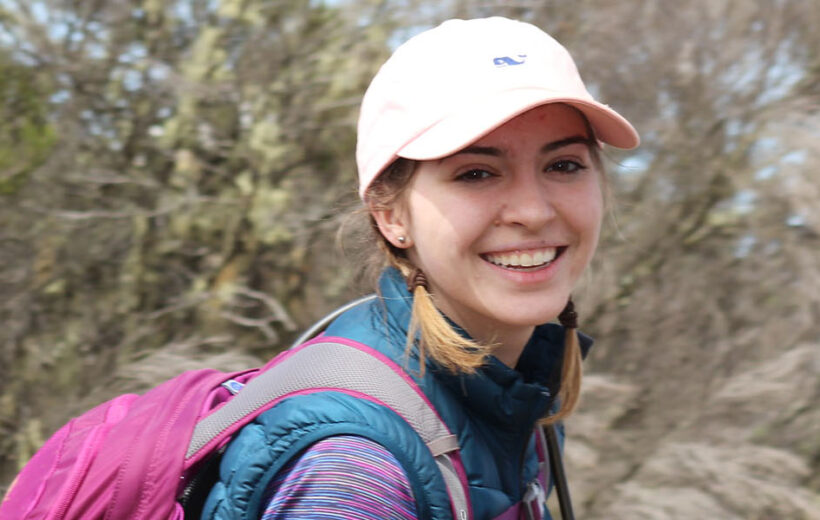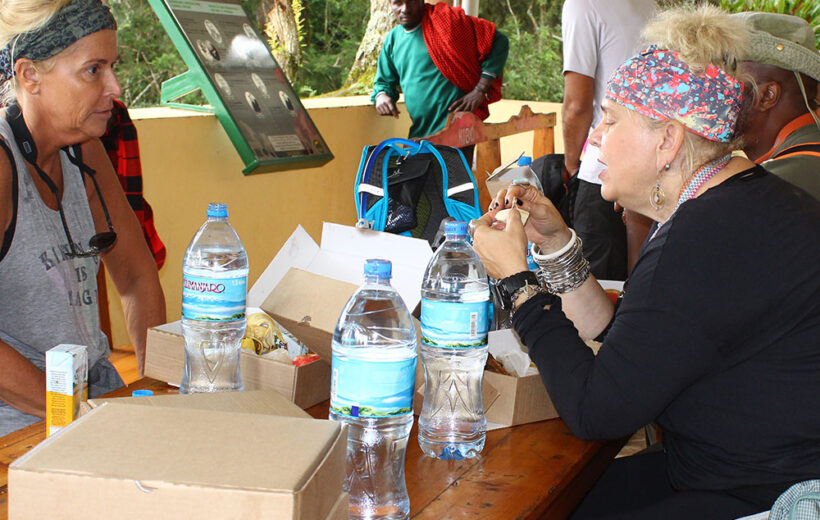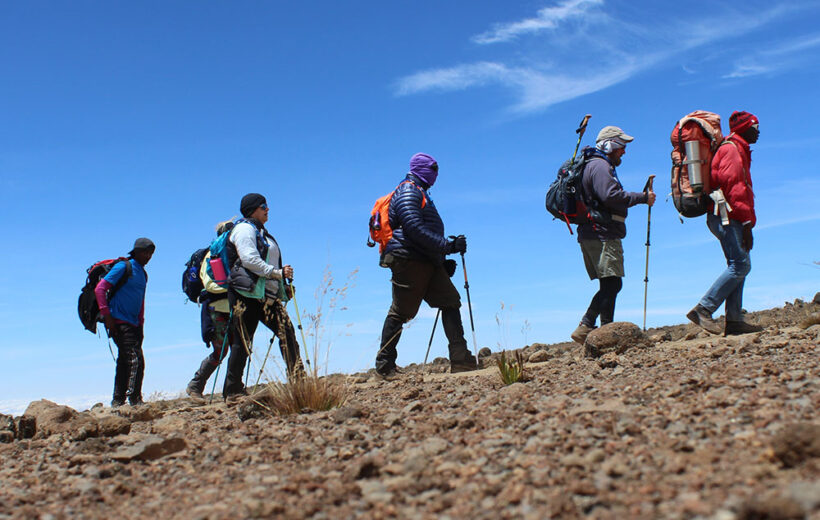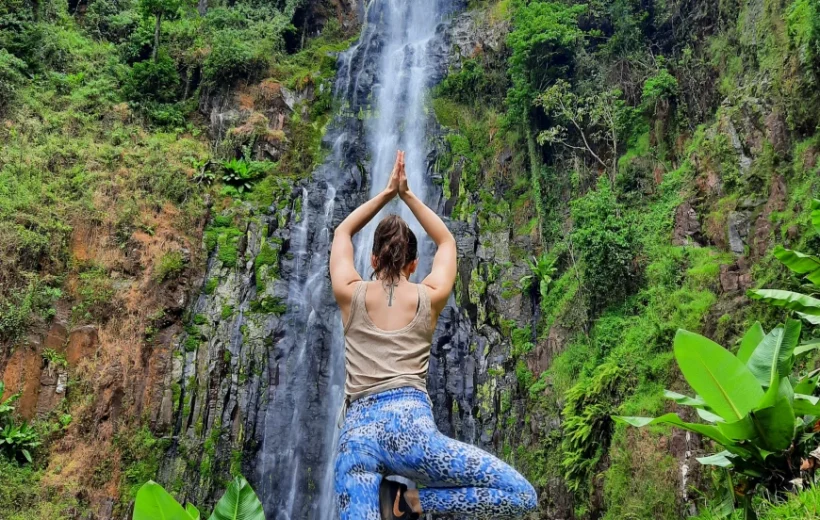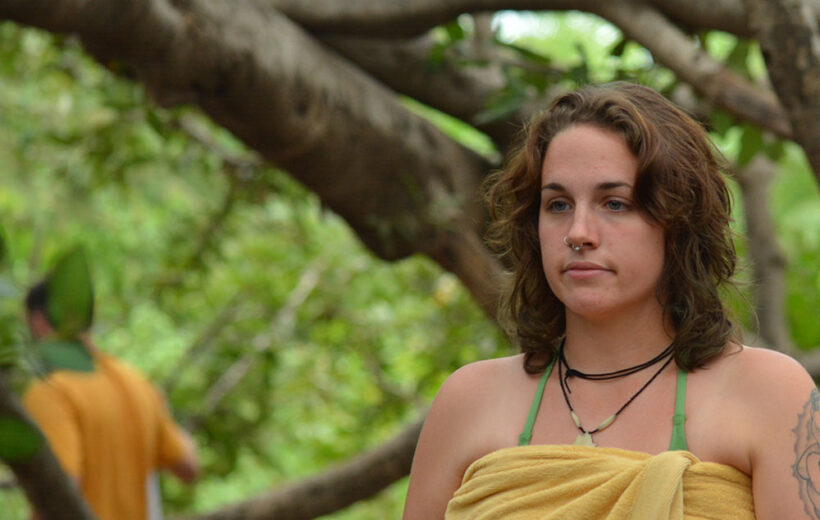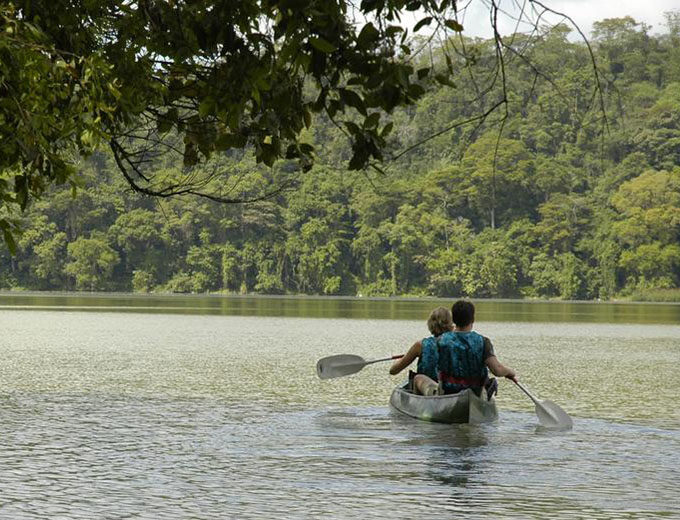Kilimanjaro Rongai Route 6 Days
Tour Overview
Rongai Route 6 Days is the only trail that starts from the Northern part side of Mt. Kilimanjaro. Despite some claims that this route begins on the “Kenyan side” of Mount Kilimanjaro, the whole of Africa’s highest mountain is within the borders of Tanzania. The start of the Rongai route is closer to the Kenyan border than other routes, but the entire trek takes place exclusively in Tanzania.
Because of its remote location, the route receives the least traffic of all the routes on Kilimanjaro and offers trekkers a relatively unspoiled wilderness experience where it is possible to see large wildlife like antelope, elephants, and buffalo.
The North-East side of the mountain gets significantly less moisture than the southern slopes which means that trekkers are less likely to encounter rain. Trekkers are also more likely to get clear, unclouded views of the mountain.
The Rongai Route is flatter than the other Kilimanjaro routes but because of its profile, it does not offer trekkers good options to climb high and sleep low.
It can be hiked on a six, seven, or even eight-day route. The seven or eight-day Rongai Routes are highly recommended as trekkers have extra days to acclimatize. Summit night from Kibo Hut is steep and follows the same path taken by Marangu trekkers which passes Gilman’s Point to Uhuru Peak. Then descends via the Marangu trail.
Highlights on Rongai Route 6 Days
- Departure and Return Place: Moshi Town to Rongai Gate and then back to Kilimanjaro International Airport (Google Map)
- Departure Time: Please be ready by 8:15 AM for a prompt departure at 9:30 AM.
- Return Time: Approximately 10:30 AM on the last day.
- Dress Code: Casual. Comfortable athletic clothing, hiking shoes, hat, cold weather jacket, gloves, pants, and spare clothing.
- Accommodation: Two nights of accommodations based on Bed and Breakfast at 3 stars hotel (upgrades on request).
- Extensions: Trip Extensions are available on request
- Season: All year round
- Suitable for: Moderate fitness with previous trekking experience ideal
- Pros: It's less crowded, recommended during the rainy season, has an incredible view of the mountain throughout the hike by descending via Marangu for a diverse trek, high chances of spotting wildlife, and easy daily hikes.
- Cons: Not ideal for acclimatization, due to overnight camp placements, some find summiting through Kibo Hut camp harder than through Barafu
Departures everyday
Itinerary
Day 1 Arrival
Arrival at Kilimanjaro international airport (JRO), where you will meet an Go Ahead Trip representative, and transfer to the hotel under the rate. The hotel will provide all the essential for a comfortable stay : cozy rooms , hot water , a swimming pool and internet access. In the evening there will be a briefing with our managers, who will also make sure you are ready to begin the climb.
Day 2 Rongai Gate (1950m) – 1st Caves Camp (2600m)
After an early breakfast at your hotel, you will be picked up from Arusha (1400m) and driven to the Marangu Gate (1980m). At the gate, the porters will organize and pack the belongings for the hike while you and your guide register with the Tanzania National Park (TANAPA). You will then be transferred by vehicle to the Rongai trailhead, which is 2.5 hours away from the Managu Gate. The trail begins in the tall cornfields then leads into the pine forest. This trail has a gradual ascent and allows hikers to enjoy their surroundings. About halfway up the trail you will have a lunch break and you will reach the 1st Caves Camp (2600m) in the late afternoon or early evening. The porters and chef, who move very fast up the mountain, will reach camp before you and set up your tents, boil drinking water, and prepare snacks for your arrival. After washing up, a hot dinner will be served. For overnight, mountain temperatures may drop to freezing so be prepared!
Hiking time: 5 hours
Distance: Approximately 8 kilometers
Habitat: Montane Forest
Day 3 1st Caves Camp (2600m) – Kikelewa Cave (3600m)
Following a hot breakfast, hikers will continue their ascent to Kikelewa Cave (3600m). The trail passes Second Cave (3450m) and this is a good spot to take a lunch break. Similar to the first night, your tents will be set up prior to arriving at camp and the porters will prepare drinking and washing water for you. You will enjoy evening snacks then dinner prepared by our chef. Be prepared for a cold night as temperatures drop below freezing at this exposed camp.
Hiking time: 6-7 hours
Habitat: Moorlands
Day 4 Kikelewa Cave (3600) – Mawenzi Tarn Camp (4330m)
On this day, hikers will enjoy a short, yet steep trail to Mawenzi Tarn Camp (4330m). In the moorland, you will spot exotic plants, including giant lobelia and groundsel. At camp, hikers will enjoy spectacular views and allow their bodies to acclimate. Hot dinner and washing water will be prepared for hikers as they enjoy the magnificent sunset.
Hiking time: 3-4 hours
Habitat: Moorlands
Day 5 Mawenzi Tarn Camp (4330m) – Kibo Hut (4700m)
After breakfast, hikers will continue ascending east for a half-day hike to Kibo Hut. Kibo is located in the “Saddle,” which refers to the area located between the peaks of Mawenzi and Kibo in an alpine desert. There is no water at this camp, but hikers can buy mineral water and soft drinks at the camp office. An early dinner will be served so hikers can rest before attempting the summit the same night. Your guide will brief you in detail on how to prepare for summit night. Get to sleep by 19:00!
Hiking time: 4-5 hours
Habitat: Alpine desert
Day 6 Summit Attempt Kibo Hut (4700m) – Uhuru Peak (5895m) – Horombo Hut (3720m)
Your guide will wake you around 23:30 for tea and biscuits. You will then begin your summit attempt. The trail is rocky up to Hans Meyer Cave (5150m). You continue your ascent to Gillman’s point (5681m). Reaching this section is an impressive achievement as the trail is steep, rocky, and at high altitude. Gillman’s is located on the crater rim. From this point, you will usually experience a snow covered trail until you reach the summit, Uhuru Peak (5895m). Reaching the summit of Mt. Kilimanjaro is a lifetime accomplishment! You will be able to spend a short time on the summit taking photographs and drinking tea before the descent to Barafu begins. The hike down to Kibo Hut takes about 3 hours.
At Kibo Hut, you will rest and enjoy a hot lunch in the sun. After eating, you will continue descending down to Horombo Hut (3720m). You will have a dinner, wash, and rest soundly at the hut after a strenuous day.
Hiking time: 8 hours to Uhuru and 6 hours to Horombo
Habitat: Stone scree / ice-cap summit
Distance: Approximately 6 kilometers ascent and 21 kilometers descent
Day 7 Horombo Hut (3720m) – Marangu Gate (1980m)
Following a well-deserved breakfast, your staff will have a big celebration full of dancing and singing. It is here on the mountain that you will present your tips to the guide, assistant guides, chef(s), and porters. After celebrating, you will descend for 6 hours back to Marangu Gate (1980m). The National Park requires all hikers to sign their names to receive certificates of completion. Hikers who reached Gillman’s Point (5681m) receive green certificates and hikers who reached Uhuru Peak (5895m) receive gold certificates. After receiving certificates, you will drive back to Moshi in your hotel.
Hiking time: 6 hours
Distance: Approximately 27 kilometers
Day 8 Departure
Rest in the hotel before the transfer to the airport for your flight home.
Pricing Includes
- Two way private airport transfers
- All park fees collected by the National Park
- Hotel ccommodations one night before and one night after the expedition
- Tented accommodation on Mount Kilimanjaro
- All meals on the hike
- All group equipment (dining tent, table, chairs, crockery and cutlery)
- Oxygen cylinders and oximeters
- Complete Expedition medical kits
- Professional guides licensed by Kilimanjaro National Park
- Dedicated support crew (assistant guides, camp master, porters, cooks, etc.)
- Government taxes
- Crew salaries
- Medical evacuations with AMREF Flying doctors
- Purified water while on the mountain
- Portable tented private flush toilet
Pricing Excludes
- Personal Climbing gears
- Tanzania Visa on arrival
- Mountaineering Insurance
- Tips and Gratuities
- Personal Expenses (e.g. laundry, telephone, beverages, etc.)
FAQs
I would like to book but I have group is large group, is this a problem?
Where is Kilimanjaro?
How high is Kilimanjaro?
What kind of experience do I need?
How long is the hike?
What will I eat - I am a vegetarian?
Do we tip the hiking crew?
Are there charging stations on Mount Kilimanjaro?
Who are your operators in Tanzania?
Do You Offer Private & Fully Customizable Climbs For Kilimanjaro?
What travel documents do I need?
Do You Offer Private and Fully Customizable Climbs For Kilimanjaro
Do You Offer Crater Camp Option On Kilimanjaro Climbs
How many hours will I trek each day?
Will I see wildlife?
What kind of food will I eat?
What are the Kilimanjaro accommodations like?
Who are your operators in Tanzania?
Do you arrange airport pick up & Drop off?
When is the best time to climb Kilimanjaro?
Other Tour Details
Tour Pricing
| Number of People | Cost Per Person in US($) Classic Package | Cost Per Person in US($) Premium Package |
|---|---|---|
| 1 Person | $1,670 | $2,230 |
| 2 People | $1,465 | $1,870 |
| 3 People | $1,455 | $1,830 |
| 4 People | $1,445 | $1,800 |
| 5 People | $1,435 | $1,750 |
| 6 People | $1,425 | $1,700 |
| 7 People | $1,415 | $1,680 |
| 8 People | $1,405 | $1,670 |
| 9 People | $1,395 | $1,660 |
| 10 People + | $1,385 | $1,650 |
Tour Accommodations
| Classic Package | Premium Package |
|---|---|
| 2 nights Accommodations at your own choice of hotel according to your budget | 2 nights Accommodations on BB at either of the following Panama Garden resort or Ameg Lodge |
Tour Map
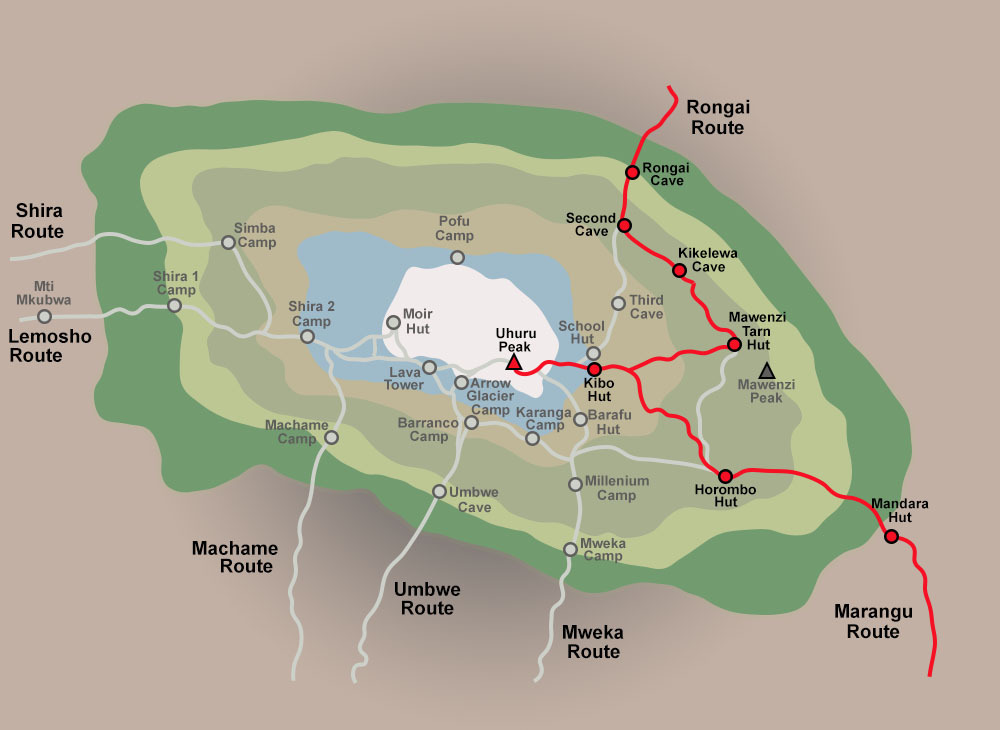
You may like
Book this tour
Daily Short Day Tour Deals
Got a Question or Want Help?
Why Book With Us?
- Middle-man Free Pricing
- Customer care available 24/7
- Hand-picked Tours & Activities
- Evacuation by AMREF Flying Doctors
- 100% Customizable
- Safety and trust
- Local Knowledge



